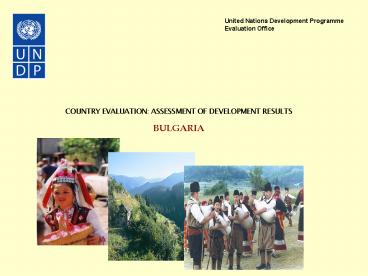United Nations Development Programme - PowerPoint PPT Presentation
1 / 9
Title:
United Nations Development Programme
Description:
The ADR is an in-depth and independent results assessment ... Ensure sustainability of the demonstrative pilots in local governance. ... – PowerPoint PPT presentation
Number of Views:51
Avg rating:3.0/5.0
Title: United Nations Development Programme
1
United Nations Development Programme Evaluation
Office
COUNTRY EVALUATION ASSESSMENT OF DEVELOPMENT
RESULTS BULGARIA
2
ADR CONCEPT
- The ADR is an in-depth and independent results
assessment - mechanism that will provide a measure of
development - effectiveness of UNDPs interventions in a
country - Strategic Perspective
- Focus on Outcome
- Value added and Leveraging UNDP distinctiveness
- Partnership for Results
3
COUNTRY CONTEXT
Population (2001) 8.1 million HDI Rank (2002)
62 (of 173) Life expectancy at birth (1995-2000)
70.8 years GDP per capita (2000 in PPP US)
1,560 GDP per capita annual growth rate
(2001-2003) 4. 5 Population below national
poverty line (2002) 22 Unemployment rate
(2000) 19 Population of ethnic minorities
(mainly Turks Roma) 13 Seats in Parliament
held by women (2002) 26.2
4
DEVELOPMENT CHALLENGES
- Political Parliamentary democracy
functioning, but weak - responsiveness to local needs
- Economic Stabilization achieved, structural
transformation incomplete - Macro-economic management
- Micro-economic adjustment and private sector
development - Small enterprise development
- Poverty and Human development Growth with
increasing inequity - EU accession and public management Policy
adopted, reforms lagging - Adoption of EU legislation
- Public sector reform
- Decentralization, Participation and Local
Governance
5
BULGARIA UNDP AID RESOURCE ENVIRONMENT
Total external assistance p.a. (2000) 311
m UNDP expenditures 1997-2002 62.7 m Of
which Poverty 47.2 m Governance 12.8
m Environment 2.6 m Of which UNDP own
resources 5.5 m GoB Cost-sharing 38.1
m Other donors 18.8 m Resources mobilized
1997-2005 93.5 m
6
UNDP STRATEGIC POSITIONING RESULTS
Functional Entry Points
National Priorities Chosen
Types of Results
Areas of Actual Results
1. Role of social protection in national
policy 2. Social capital 3. Job creation and
active labour market policy 4.
Decentralization and local governance 5.
Capacity for EU accession 6. HIV/AIDS 7.
Natural resource management 8. Other areas of
UNDP influence on policy and institutional reform
Policy Change
Advocacy Policy Dialogue
Poverty
Piloting new solutions
Environment
Institutional Change
Governance
Partnership Alliances
7
(No Transcript)
8
CONCLUDING ISSUES LESSONS LEARNED
- Results require thematic focus and coherent
strategy - Resource mobilization, substantive focus and
sustainability require clear exit strategies - Coherence of decentralization could be used as
new strategic thrust - Improved targeting of the poor require greater
emphasis on minorities - UNDP requires a strategic role in relation to EU
accession - EU accession as an anchor for operational
programming - A national vision for EU accession
- UNDP role after accession
9
RECOMMENDATIONS
- Develop clear exit strategies for all projects.
- Support Government in the adoption of
anti-poverty policies and strategies with special
emphasis on poverty definition and marginalized
groups. - Strengthen UNDPs advocacy with national
authorities on the implementation of policies and
strategies. - Elaborate targeted interventions for Government
to bring institutional change for the most
marginalized groups, such as the Roma, low-income
households, vulnerable children and youth. - Develop the employment promotion approach to
include more long-term job creation projects. - Ensure sustainability of the demonstrative pilots
in local governance.































